Case Study: Religious Freedom vs. Discrimination in Wedbells v. BC
VerifiedAdded on 2020/04/29
|9
|3668
|370
Case Study
AI Summary
This case study analyzes the British Columbia Human Rights Tribunal case of Wedbells v. Province of British Columbia. The complainant, a marriage commissioner, was terminated for refusing to perform same-sex marriage ceremonies due to her religious beliefs. The case examines the conflict between religious freedom and the prohibition of discrimination. The complainant argued her termination violated her right to religious freedom, drawing parallels to medical professionals' rights to refuse certain procedures. The respondent argued that the commissioner's actions constituted discrimination and that the requirement to perform same-sex marriages was a bona fide occupational requirement. The case explores the extent to which religious beliefs can justify discrimination, the concept of undue hardship in accommodation, and the balance between individual rights and societal values. The analysis considers the submissions of both parties, the legal precedents cited, and the potential implications for human rights law.
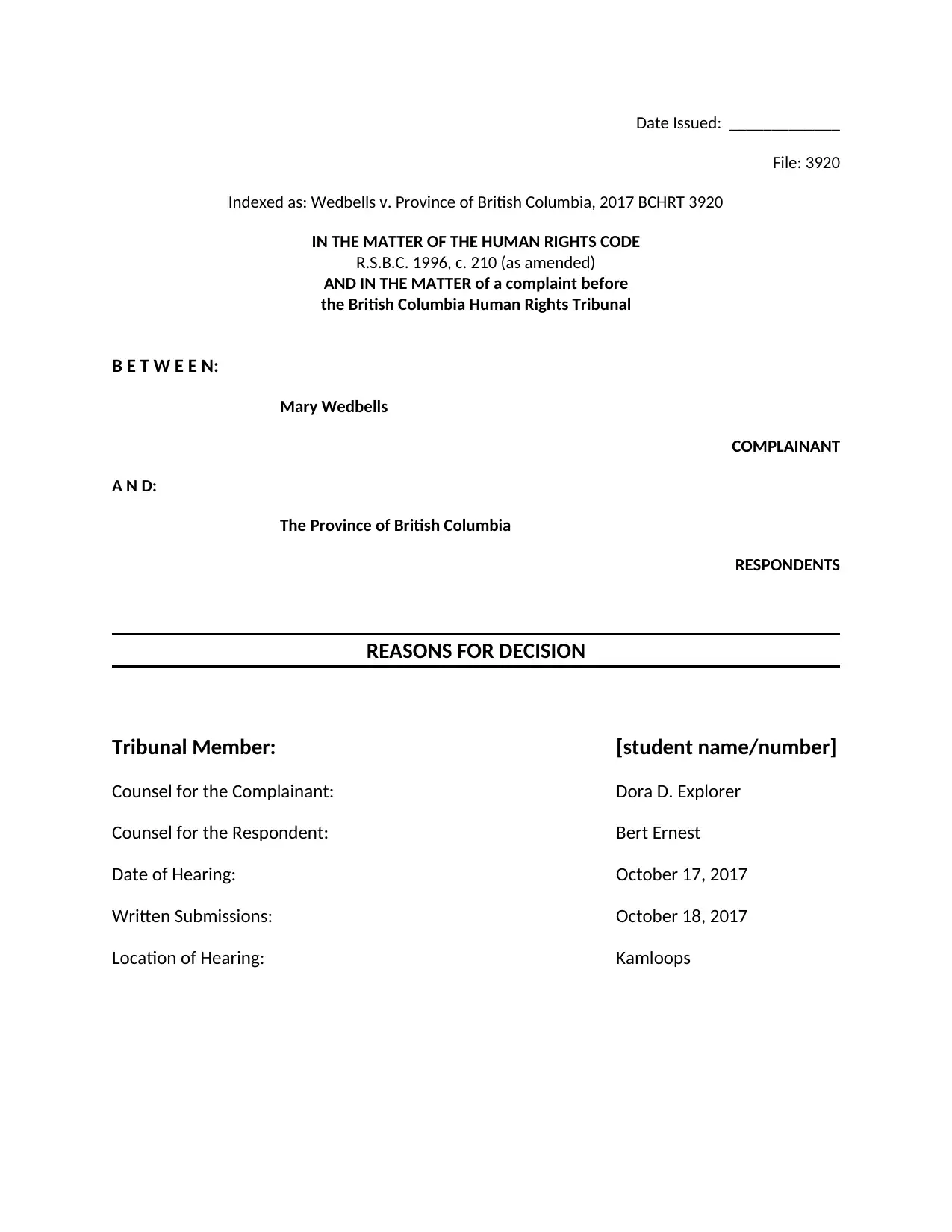
Date Issued: _____________
File: 3920
Indexed as: Wedbells v. Province of British Columbia, 2017 BCHRT 3920
IN THE MATTER OF THE HUMAN RIGHTS CODE
R.S.B.C. 1996, c. 210 (as amended)
AND IN THE MATTER of a complaint before
the British Columbia Human Rights Tribunal
B E T W E E N:
Mary Wedbells
COMPLAINANT
A N D:
The Province of British Columbia
RESPONDENTS
REASONS FOR DECISION
Tribunal Member: [student name/number]
Counsel for the Complainant: Dora D. Explorer
Counsel for the Respondent: Bert Ernest
Date of Hearing: October 17, 2017
Written Submissions: October 18, 2017
Location of Hearing: Kamloops
File: 3920
Indexed as: Wedbells v. Province of British Columbia, 2017 BCHRT 3920
IN THE MATTER OF THE HUMAN RIGHTS CODE
R.S.B.C. 1996, c. 210 (as amended)
AND IN THE MATTER of a complaint before
the British Columbia Human Rights Tribunal
B E T W E E N:
Mary Wedbells
COMPLAINANT
A N D:
The Province of British Columbia
RESPONDENTS
REASONS FOR DECISION
Tribunal Member: [student name/number]
Counsel for the Complainant: Dora D. Explorer
Counsel for the Respondent: Bert Ernest
Date of Hearing: October 17, 2017
Written Submissions: October 18, 2017
Location of Hearing: Kamloops
Paraphrase This Document
Need a fresh take? Get an instant paraphrase of this document with our AI Paraphraser
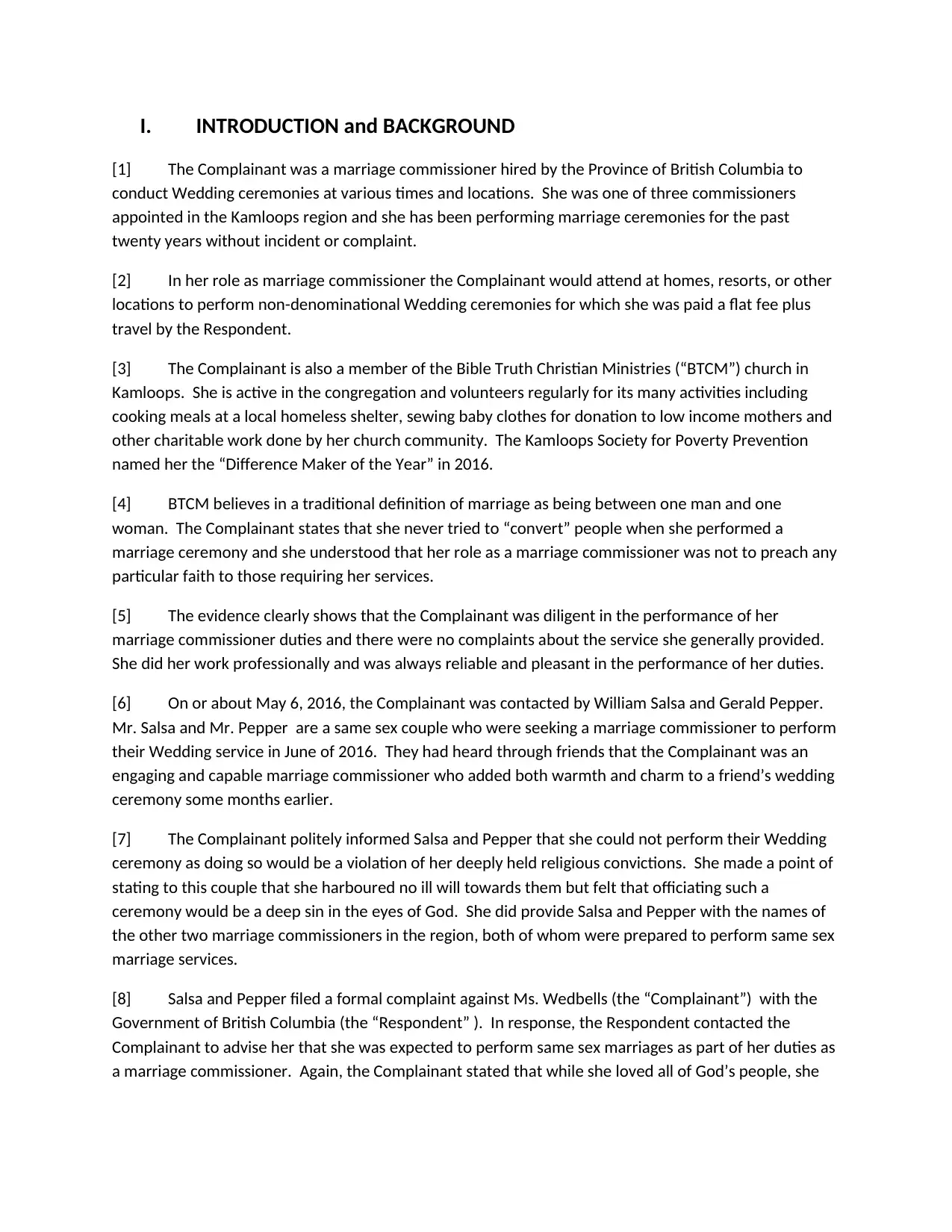
I. INTRODUCTION and BACKGROUND
[1] The Complainant was a marriage commissioner hired by the Province of British Columbia to
conduct Wedding ceremonies at various times and locations. She was one of three commissioners
appointed in the Kamloops region and she has been performing marriage ceremonies for the past
twenty years without incident or complaint.
[2] In her role as marriage commissioner the Complainant would attend at homes, resorts, or other
locations to perform non-denominational Wedding ceremonies for which she was paid a flat fee plus
travel by the Respondent.
[3] The Complainant is also a member of the Bible Truth Christian Ministries (“BTCM”) church in
Kamloops. She is active in the congregation and volunteers regularly for its many activities including
cooking meals at a local homeless shelter, sewing baby clothes for donation to low income mothers and
other charitable work done by her church community. The Kamloops Society for Poverty Prevention
named her the “Difference Maker of the Year” in 2016.
[4] BTCM believes in a traditional definition of marriage as being between one man and one
woman. The Complainant states that she never tried to “convert” people when she performed a
marriage ceremony and she understood that her role as a marriage commissioner was not to preach any
particular faith to those requiring her services.
[5] The evidence clearly shows that the Complainant was diligent in the performance of her
marriage commissioner duties and there were no complaints about the service she generally provided.
She did her work professionally and was always reliable and pleasant in the performance of her duties.
[6] On or about May 6, 2016, the Complainant was contacted by William Salsa and Gerald Pepper.
Mr. Salsa and Mr. Pepper are a same sex couple who were seeking a marriage commissioner to perform
their Wedding service in June of 2016. They had heard through friends that the Complainant was an
engaging and capable marriage commissioner who added both warmth and charm to a friend’s wedding
ceremony some months earlier.
[7] The Complainant politely informed Salsa and Pepper that she could not perform their Wedding
ceremony as doing so would be a violation of her deeply held religious convictions. She made a point of
stating to this couple that she harboured no ill will towards them but felt that officiating such a
ceremony would be a deep sin in the eyes of God. She did provide Salsa and Pepper with the names of
the other two marriage commissioners in the region, both of whom were prepared to perform same sex
marriage services.
[8] Salsa and Pepper filed a formal complaint against Ms. Wedbells (the “Complainant”) with the
Government of British Columbia (the “Respondent” ). In response, the Respondent contacted the
Complainant to advise her that she was expected to perform same sex marriages as part of her duties as
a marriage commissioner. Again, the Complainant stated that while she loved all of God’s people, she
[1] The Complainant was a marriage commissioner hired by the Province of British Columbia to
conduct Wedding ceremonies at various times and locations. She was one of three commissioners
appointed in the Kamloops region and she has been performing marriage ceremonies for the past
twenty years without incident or complaint.
[2] In her role as marriage commissioner the Complainant would attend at homes, resorts, or other
locations to perform non-denominational Wedding ceremonies for which she was paid a flat fee plus
travel by the Respondent.
[3] The Complainant is also a member of the Bible Truth Christian Ministries (“BTCM”) church in
Kamloops. She is active in the congregation and volunteers regularly for its many activities including
cooking meals at a local homeless shelter, sewing baby clothes for donation to low income mothers and
other charitable work done by her church community. The Kamloops Society for Poverty Prevention
named her the “Difference Maker of the Year” in 2016.
[4] BTCM believes in a traditional definition of marriage as being between one man and one
woman. The Complainant states that she never tried to “convert” people when she performed a
marriage ceremony and she understood that her role as a marriage commissioner was not to preach any
particular faith to those requiring her services.
[5] The evidence clearly shows that the Complainant was diligent in the performance of her
marriage commissioner duties and there were no complaints about the service she generally provided.
She did her work professionally and was always reliable and pleasant in the performance of her duties.
[6] On or about May 6, 2016, the Complainant was contacted by William Salsa and Gerald Pepper.
Mr. Salsa and Mr. Pepper are a same sex couple who were seeking a marriage commissioner to perform
their Wedding service in June of 2016. They had heard through friends that the Complainant was an
engaging and capable marriage commissioner who added both warmth and charm to a friend’s wedding
ceremony some months earlier.
[7] The Complainant politely informed Salsa and Pepper that she could not perform their Wedding
ceremony as doing so would be a violation of her deeply held religious convictions. She made a point of
stating to this couple that she harboured no ill will towards them but felt that officiating such a
ceremony would be a deep sin in the eyes of God. She did provide Salsa and Pepper with the names of
the other two marriage commissioners in the region, both of whom were prepared to perform same sex
marriage services.
[8] Salsa and Pepper filed a formal complaint against Ms. Wedbells (the “Complainant”) with the
Government of British Columbia (the “Respondent” ). In response, the Respondent contacted the
Complainant to advise her that she was expected to perform same sex marriages as part of her duties as
a marriage commissioner. Again, the Complainant stated that while she loved all of God’s people, she
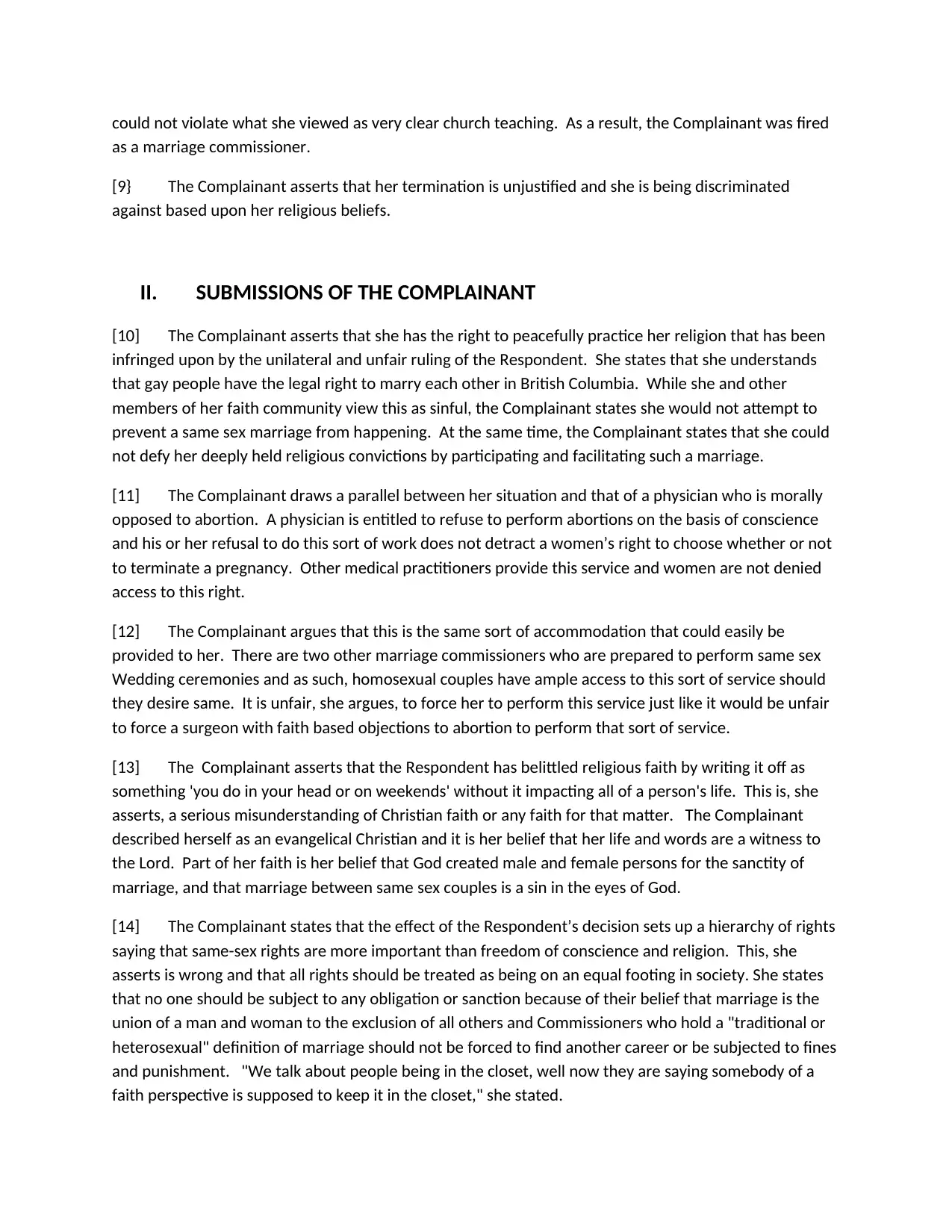
could not violate what she viewed as very clear church teaching. As a result, the Complainant was fired
as a marriage commissioner.
[9} The Complainant asserts that her termination is unjustified and she is being discriminated
against based upon her religious beliefs.
II. SUBMISSIONS OF THE COMPLAINANT
[10] The Complainant asserts that she has the right to peacefully practice her religion that has been
infringed upon by the unilateral and unfair ruling of the Respondent. She states that she understands
that gay people have the legal right to marry each other in British Columbia. While she and other
members of her faith community view this as sinful, the Complainant states she would not attempt to
prevent a same sex marriage from happening. At the same time, the Complainant states that she could
not defy her deeply held religious convictions by participating and facilitating such a marriage.
[11] The Complainant draws a parallel between her situation and that of a physician who is morally
opposed to abortion. A physician is entitled to refuse to perform abortions on the basis of conscience
and his or her refusal to do this sort of work does not detract a women’s right to choose whether or not
to terminate a pregnancy. Other medical practitioners provide this service and women are not denied
access to this right.
[12] The Complainant argues that this is the same sort of accommodation that could easily be
provided to her. There are two other marriage commissioners who are prepared to perform same sex
Wedding ceremonies and as such, homosexual couples have ample access to this sort of service should
they desire same. It is unfair, she argues, to force her to perform this service just like it would be unfair
to force a surgeon with faith based objections to abortion to perform that sort of service.
[13] The Complainant asserts that the Respondent has belittled religious faith by writing it off as
something 'you do in your head or on weekends' without it impacting all of a person's life. This is, she
asserts, a serious misunderstanding of Christian faith or any faith for that matter. The Complainant
described herself as an evangelical Christian and it is her belief that her life and words are a witness to
the Lord. Part of her faith is her belief that God created male and female persons for the sanctity of
marriage, and that marriage between same sex couples is a sin in the eyes of God.
[14] The Complainant states that the effect of the Respondent’s decision sets up a hierarchy of rights
saying that same-sex rights are more important than freedom of conscience and religion. This, she
asserts is wrong and that all rights should be treated as being on an equal footing in society. She states
that no one should be subject to any obligation or sanction because of their belief that marriage is the
union of a man and woman to the exclusion of all others and Commissioners who hold a "traditional or
heterosexual" definition of marriage should not be forced to find another career or be subjected to fines
and punishment. "We talk about people being in the closet, well now they are saying somebody of a
faith perspective is supposed to keep it in the closet," she stated.
as a marriage commissioner.
[9} The Complainant asserts that her termination is unjustified and she is being discriminated
against based upon her religious beliefs.
II. SUBMISSIONS OF THE COMPLAINANT
[10] The Complainant asserts that she has the right to peacefully practice her religion that has been
infringed upon by the unilateral and unfair ruling of the Respondent. She states that she understands
that gay people have the legal right to marry each other in British Columbia. While she and other
members of her faith community view this as sinful, the Complainant states she would not attempt to
prevent a same sex marriage from happening. At the same time, the Complainant states that she could
not defy her deeply held religious convictions by participating and facilitating such a marriage.
[11] The Complainant draws a parallel between her situation and that of a physician who is morally
opposed to abortion. A physician is entitled to refuse to perform abortions on the basis of conscience
and his or her refusal to do this sort of work does not detract a women’s right to choose whether or not
to terminate a pregnancy. Other medical practitioners provide this service and women are not denied
access to this right.
[12] The Complainant argues that this is the same sort of accommodation that could easily be
provided to her. There are two other marriage commissioners who are prepared to perform same sex
Wedding ceremonies and as such, homosexual couples have ample access to this sort of service should
they desire same. It is unfair, she argues, to force her to perform this service just like it would be unfair
to force a surgeon with faith based objections to abortion to perform that sort of service.
[13] The Complainant asserts that the Respondent has belittled religious faith by writing it off as
something 'you do in your head or on weekends' without it impacting all of a person's life. This is, she
asserts, a serious misunderstanding of Christian faith or any faith for that matter. The Complainant
described herself as an evangelical Christian and it is her belief that her life and words are a witness to
the Lord. Part of her faith is her belief that God created male and female persons for the sanctity of
marriage, and that marriage between same sex couples is a sin in the eyes of God.
[14] The Complainant states that the effect of the Respondent’s decision sets up a hierarchy of rights
saying that same-sex rights are more important than freedom of conscience and religion. This, she
asserts is wrong and that all rights should be treated as being on an equal footing in society. She states
that no one should be subject to any obligation or sanction because of their belief that marriage is the
union of a man and woman to the exclusion of all others and Commissioners who hold a "traditional or
heterosexual" definition of marriage should not be forced to find another career or be subjected to fines
and punishment. "We talk about people being in the closet, well now they are saying somebody of a
faith perspective is supposed to keep it in the closet," she stated.
⊘ This is a preview!⊘
Do you want full access?
Subscribe today to unlock all pages.

Trusted by 1+ million students worldwide
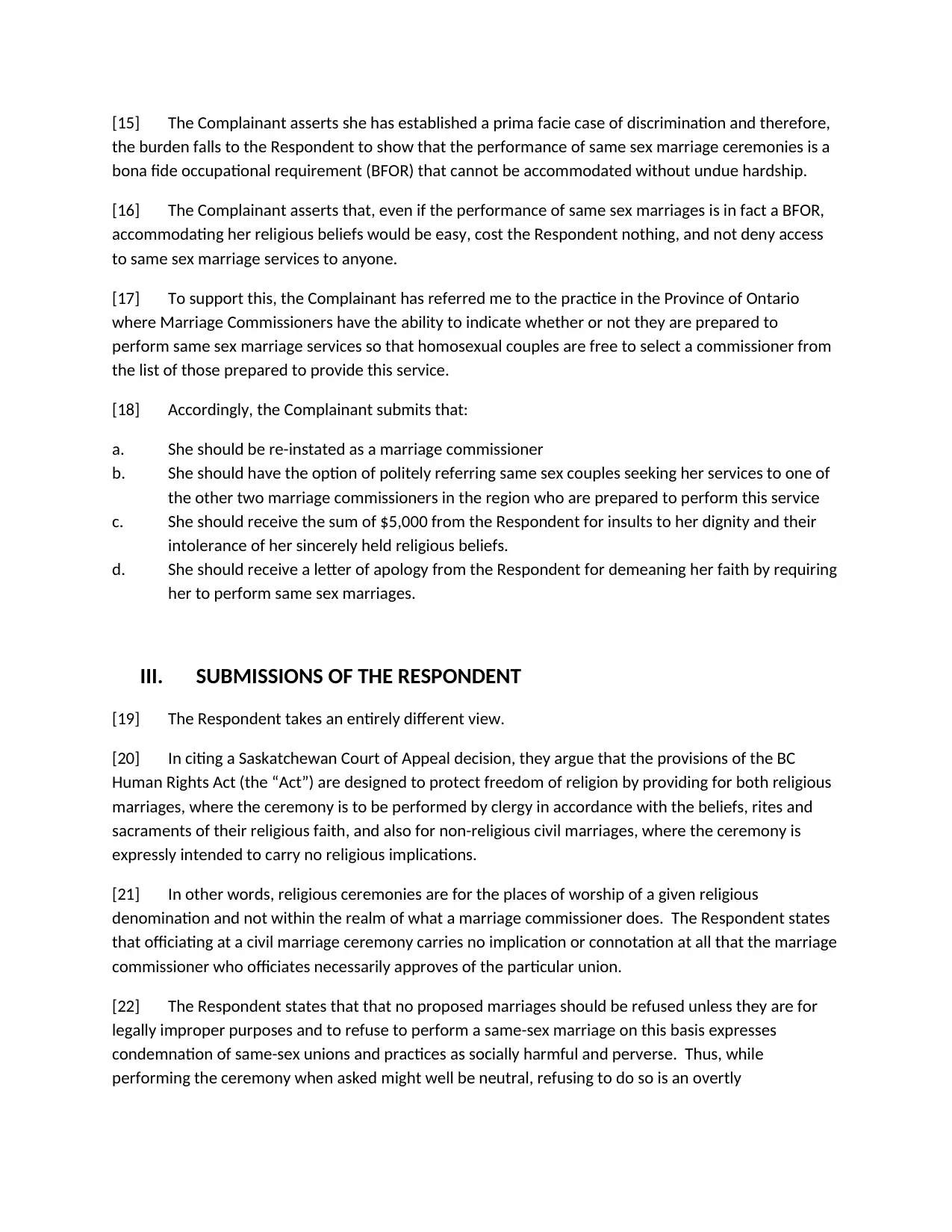
[15] The Complainant asserts she has established a prima facie case of discrimination and therefore,
the burden falls to the Respondent to show that the performance of same sex marriage ceremonies is a
bona fide occupational requirement (BFOR) that cannot be accommodated without undue hardship.
[16] The Complainant asserts that, even if the performance of same sex marriages is in fact a BFOR,
accommodating her religious beliefs would be easy, cost the Respondent nothing, and not deny access
to same sex marriage services to anyone.
[17] To support this, the Complainant has referred me to the practice in the Province of Ontario
where Marriage Commissioners have the ability to indicate whether or not they are prepared to
perform same sex marriage services so that homosexual couples are free to select a commissioner from
the list of those prepared to provide this service.
[18] Accordingly, the Complainant submits that:
a. She should be re-instated as a marriage commissioner
b. She should have the option of politely referring same sex couples seeking her services to one of
the other two marriage commissioners in the region who are prepared to perform this service
c. She should receive the sum of $5,000 from the Respondent for insults to her dignity and their
intolerance of her sincerely held religious beliefs.
d. She should receive a letter of apology from the Respondent for demeaning her faith by requiring
her to perform same sex marriages.
III. SUBMISSIONS OF THE RESPONDENT
[19] The Respondent takes an entirely different view.
[20] In citing a Saskatchewan Court of Appeal decision, they argue that the provisions of the BC
Human Rights Act (the “Act”) are designed to protect freedom of religion by providing for both religious
marriages, where the ceremony is to be performed by clergy in accordance with the beliefs, rites and
sacraments of their religious faith, and also for non-religious civil marriages, where the ceremony is
expressly intended to carry no religious implications.
[21] In other words, religious ceremonies are for the places of worship of a given religious
denomination and not within the realm of what a marriage commissioner does. The Respondent states
that officiating at a civil marriage ceremony carries no implication or connotation at all that the marriage
commissioner who officiates necessarily approves of the particular union.
[22] The Respondent states that that no proposed marriages should be refused unless they are for
legally improper purposes and to refuse to perform a same-sex marriage on this basis expresses
condemnation of same-sex unions and practices as socially harmful and perverse. Thus, while
performing the ceremony when asked might well be neutral, refusing to do so is an overtly
the burden falls to the Respondent to show that the performance of same sex marriage ceremonies is a
bona fide occupational requirement (BFOR) that cannot be accommodated without undue hardship.
[16] The Complainant asserts that, even if the performance of same sex marriages is in fact a BFOR,
accommodating her religious beliefs would be easy, cost the Respondent nothing, and not deny access
to same sex marriage services to anyone.
[17] To support this, the Complainant has referred me to the practice in the Province of Ontario
where Marriage Commissioners have the ability to indicate whether or not they are prepared to
perform same sex marriage services so that homosexual couples are free to select a commissioner from
the list of those prepared to provide this service.
[18] Accordingly, the Complainant submits that:
a. She should be re-instated as a marriage commissioner
b. She should have the option of politely referring same sex couples seeking her services to one of
the other two marriage commissioners in the region who are prepared to perform this service
c. She should receive the sum of $5,000 from the Respondent for insults to her dignity and their
intolerance of her sincerely held religious beliefs.
d. She should receive a letter of apology from the Respondent for demeaning her faith by requiring
her to perform same sex marriages.
III. SUBMISSIONS OF THE RESPONDENT
[19] The Respondent takes an entirely different view.
[20] In citing a Saskatchewan Court of Appeal decision, they argue that the provisions of the BC
Human Rights Act (the “Act”) are designed to protect freedom of religion by providing for both religious
marriages, where the ceremony is to be performed by clergy in accordance with the beliefs, rites and
sacraments of their religious faith, and also for non-religious civil marriages, where the ceremony is
expressly intended to carry no religious implications.
[21] In other words, religious ceremonies are for the places of worship of a given religious
denomination and not within the realm of what a marriage commissioner does. The Respondent states
that officiating at a civil marriage ceremony carries no implication or connotation at all that the marriage
commissioner who officiates necessarily approves of the particular union.
[22] The Respondent states that that no proposed marriages should be refused unless they are for
legally improper purposes and to refuse to perform a same-sex marriage on this basis expresses
condemnation of same-sex unions and practices as socially harmful and perverse. Thus, while
performing the ceremony when asked might well be neutral, refusing to do so is an overtly
Paraphrase This Document
Need a fresh take? Get an instant paraphrase of this document with our AI Paraphraser
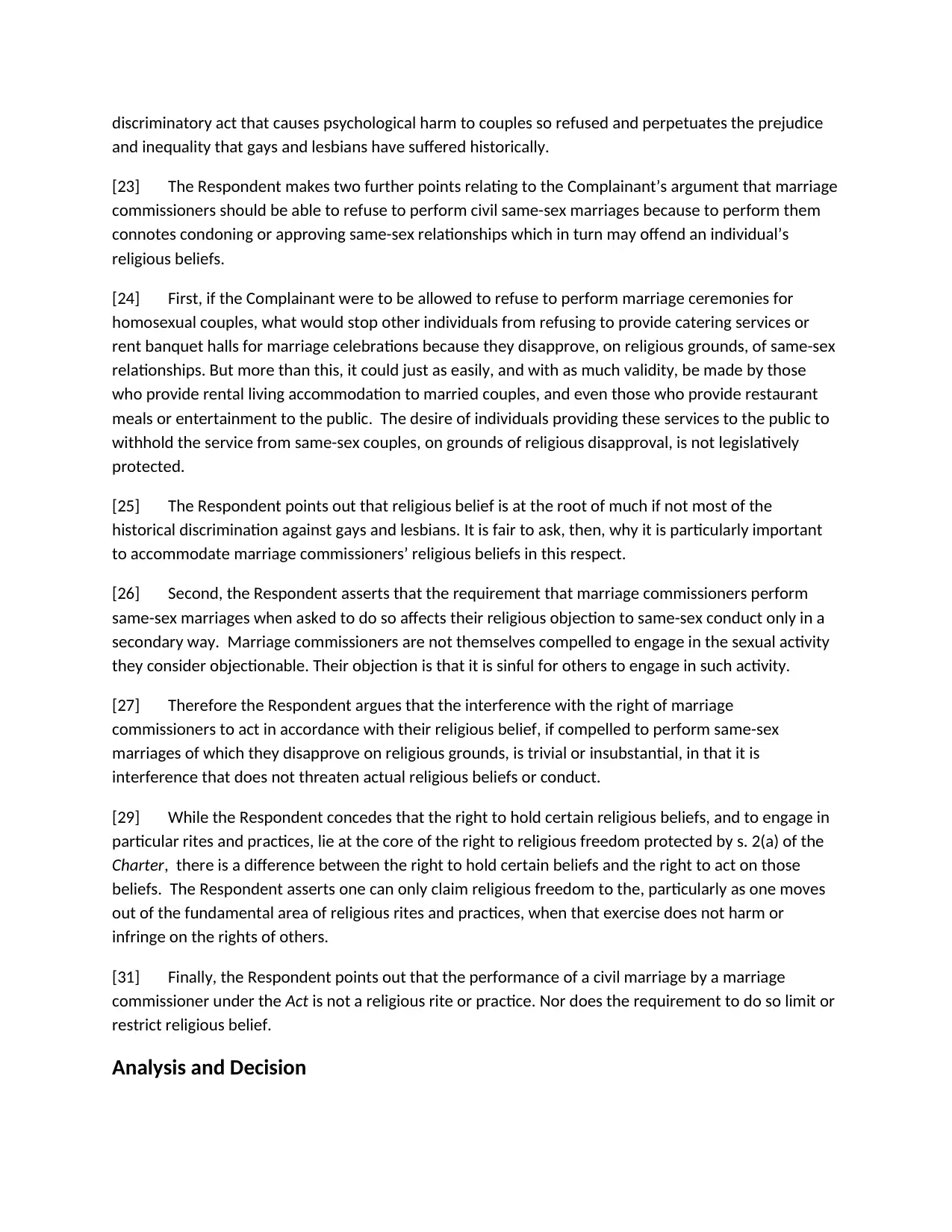
discriminatory act that causes psychological harm to couples so refused and perpetuates the prejudice
and inequality that gays and lesbians have suffered historically.
[23] The Respondent makes two further points relating to the Complainant’s argument that marriage
commissioners should be able to refuse to perform civil same-sex marriages because to perform them
connotes condoning or approving same-sex relationships which in turn may offend an individual’s
religious beliefs.
[24] First, if the Complainant were to be allowed to refuse to perform marriage ceremonies for
homosexual couples, what would stop other individuals from refusing to provide catering services or
rent banquet halls for marriage celebrations because they disapprove, on religious grounds, of same-sex
relationships. But more than this, it could just as easily, and with as much validity, be made by those
who provide rental living accommodation to married couples, and even those who provide restaurant
meals or entertainment to the public. The desire of individuals providing these services to the public to
withhold the service from same-sex couples, on grounds of religious disapproval, is not legislatively
protected.
[25] The Respondent points out that religious belief is at the root of much if not most of the
historical discrimination against gays and lesbians. It is fair to ask, then, why it is particularly important
to accommodate marriage commissioners’ religious beliefs in this respect.
[26] Second, the Respondent asserts that the requirement that marriage commissioners perform
same-sex marriages when asked to do so affects their religious objection to same-sex conduct only in a
secondary way. Marriage commissioners are not themselves compelled to engage in the sexual activity
they consider objectionable. Their objection is that it is sinful for others to engage in such activity.
[27] Therefore the Respondent argues that the interference with the right of marriage
commissioners to act in accordance with their religious belief, if compelled to perform same-sex
marriages of which they disapprove on religious grounds, is trivial or insubstantial, in that it is
interference that does not threaten actual religious beliefs or conduct.
[29] While the Respondent concedes that the right to hold certain religious beliefs, and to engage in
particular rites and practices, lie at the core of the right to religious freedom protected by s. 2(a) of the
Charter, there is a difference between the right to hold certain beliefs and the right to act on those
beliefs. The Respondent asserts one can only claim religious freedom to the, particularly as one moves
out of the fundamental area of religious rites and practices, when that exercise does not harm or
infringe on the rights of others.
[31] Finally, the Respondent points out that the performance of a civil marriage by a marriage
commissioner under the Act is not a religious rite or practice. Nor does the requirement to do so limit or
restrict religious belief.
Analysis and Decision
and inequality that gays and lesbians have suffered historically.
[23] The Respondent makes two further points relating to the Complainant’s argument that marriage
commissioners should be able to refuse to perform civil same-sex marriages because to perform them
connotes condoning or approving same-sex relationships which in turn may offend an individual’s
religious beliefs.
[24] First, if the Complainant were to be allowed to refuse to perform marriage ceremonies for
homosexual couples, what would stop other individuals from refusing to provide catering services or
rent banquet halls for marriage celebrations because they disapprove, on religious grounds, of same-sex
relationships. But more than this, it could just as easily, and with as much validity, be made by those
who provide rental living accommodation to married couples, and even those who provide restaurant
meals or entertainment to the public. The desire of individuals providing these services to the public to
withhold the service from same-sex couples, on grounds of religious disapproval, is not legislatively
protected.
[25] The Respondent points out that religious belief is at the root of much if not most of the
historical discrimination against gays and lesbians. It is fair to ask, then, why it is particularly important
to accommodate marriage commissioners’ religious beliefs in this respect.
[26] Second, the Respondent asserts that the requirement that marriage commissioners perform
same-sex marriages when asked to do so affects their religious objection to same-sex conduct only in a
secondary way. Marriage commissioners are not themselves compelled to engage in the sexual activity
they consider objectionable. Their objection is that it is sinful for others to engage in such activity.
[27] Therefore the Respondent argues that the interference with the right of marriage
commissioners to act in accordance with their religious belief, if compelled to perform same-sex
marriages of which they disapprove on religious grounds, is trivial or insubstantial, in that it is
interference that does not threaten actual religious beliefs or conduct.
[29] While the Respondent concedes that the right to hold certain religious beliefs, and to engage in
particular rites and practices, lie at the core of the right to religious freedom protected by s. 2(a) of the
Charter, there is a difference between the right to hold certain beliefs and the right to act on those
beliefs. The Respondent asserts one can only claim religious freedom to the, particularly as one moves
out of the fundamental area of religious rites and practices, when that exercise does not harm or
infringe on the rights of others.
[31] Finally, the Respondent points out that the performance of a civil marriage by a marriage
commissioner under the Act is not a religious rite or practice. Nor does the requirement to do so limit or
restrict religious belief.
Analysis and Decision
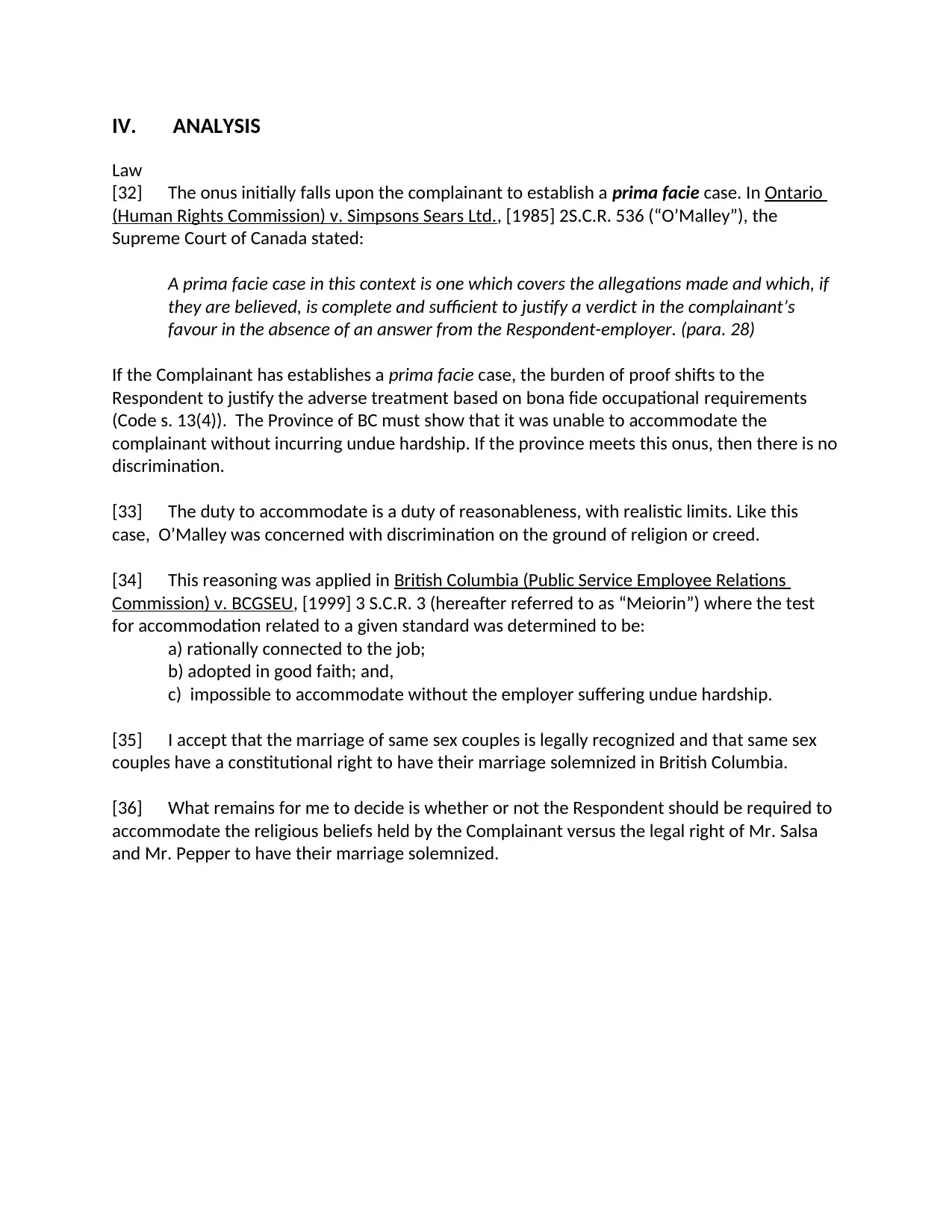
IV. ANALYSIS
Law
[32] The onus initially falls upon the complainant to establish a prima facie case. In Ontario
(Human Rights Commission) v. Simpsons Sears Ltd., [1985] 2S.C.R. 536 (“O’Malley”), the
Supreme Court of Canada stated:
A prima facie case in this context is one which covers the allegations made and which, if
they are believed, is complete and sufficient to justify a verdict in the complainant’s
favour in the absence of an answer from the Respondent-employer. (para. 28)
If the Complainant has establishes a prima facie case, the burden of proof shifts to the
Respondent to justify the adverse treatment based on bona fide occupational requirements
(Code s. 13(4)). The Province of BC must show that it was unable to accommodate the
complainant without incurring undue hardship. If the province meets this onus, then there is no
discrimination.
[33] The duty to accommodate is a duty of reasonableness, with realistic limits. Like this
case, O’Malley was concerned with discrimination on the ground of religion or creed.
[34] This reasoning was applied in British Columbia (Public Service Employee Relations
Commission) v. BCGSEU, [1999] 3 S.C.R. 3 (hereafter referred to as “Meiorin”) where the test
for accommodation related to a given standard was determined to be:
a) rationally connected to the job;
b) adopted in good faith; and,
c) impossible to accommodate without the employer suffering undue hardship.
[35] I accept that the marriage of same sex couples is legally recognized and that same sex
couples have a constitutional right to have their marriage solemnized in British Columbia.
[36] What remains for me to decide is whether or not the Respondent should be required to
accommodate the religious beliefs held by the Complainant versus the legal right of Mr. Salsa
and Mr. Pepper to have their marriage solemnized.
Law
[32] The onus initially falls upon the complainant to establish a prima facie case. In Ontario
(Human Rights Commission) v. Simpsons Sears Ltd., [1985] 2S.C.R. 536 (“O’Malley”), the
Supreme Court of Canada stated:
A prima facie case in this context is one which covers the allegations made and which, if
they are believed, is complete and sufficient to justify a verdict in the complainant’s
favour in the absence of an answer from the Respondent-employer. (para. 28)
If the Complainant has establishes a prima facie case, the burden of proof shifts to the
Respondent to justify the adverse treatment based on bona fide occupational requirements
(Code s. 13(4)). The Province of BC must show that it was unable to accommodate the
complainant without incurring undue hardship. If the province meets this onus, then there is no
discrimination.
[33] The duty to accommodate is a duty of reasonableness, with realistic limits. Like this
case, O’Malley was concerned with discrimination on the ground of religion or creed.
[34] This reasoning was applied in British Columbia (Public Service Employee Relations
Commission) v. BCGSEU, [1999] 3 S.C.R. 3 (hereafter referred to as “Meiorin”) where the test
for accommodation related to a given standard was determined to be:
a) rationally connected to the job;
b) adopted in good faith; and,
c) impossible to accommodate without the employer suffering undue hardship.
[35] I accept that the marriage of same sex couples is legally recognized and that same sex
couples have a constitutional right to have their marriage solemnized in British Columbia.
[36] What remains for me to decide is whether or not the Respondent should be required to
accommodate the religious beliefs held by the Complainant versus the legal right of Mr. Salsa
and Mr. Pepper to have their marriage solemnized.
⊘ This is a preview!⊘
Do you want full access?
Subscribe today to unlock all pages.

Trusted by 1+ million students worldwide
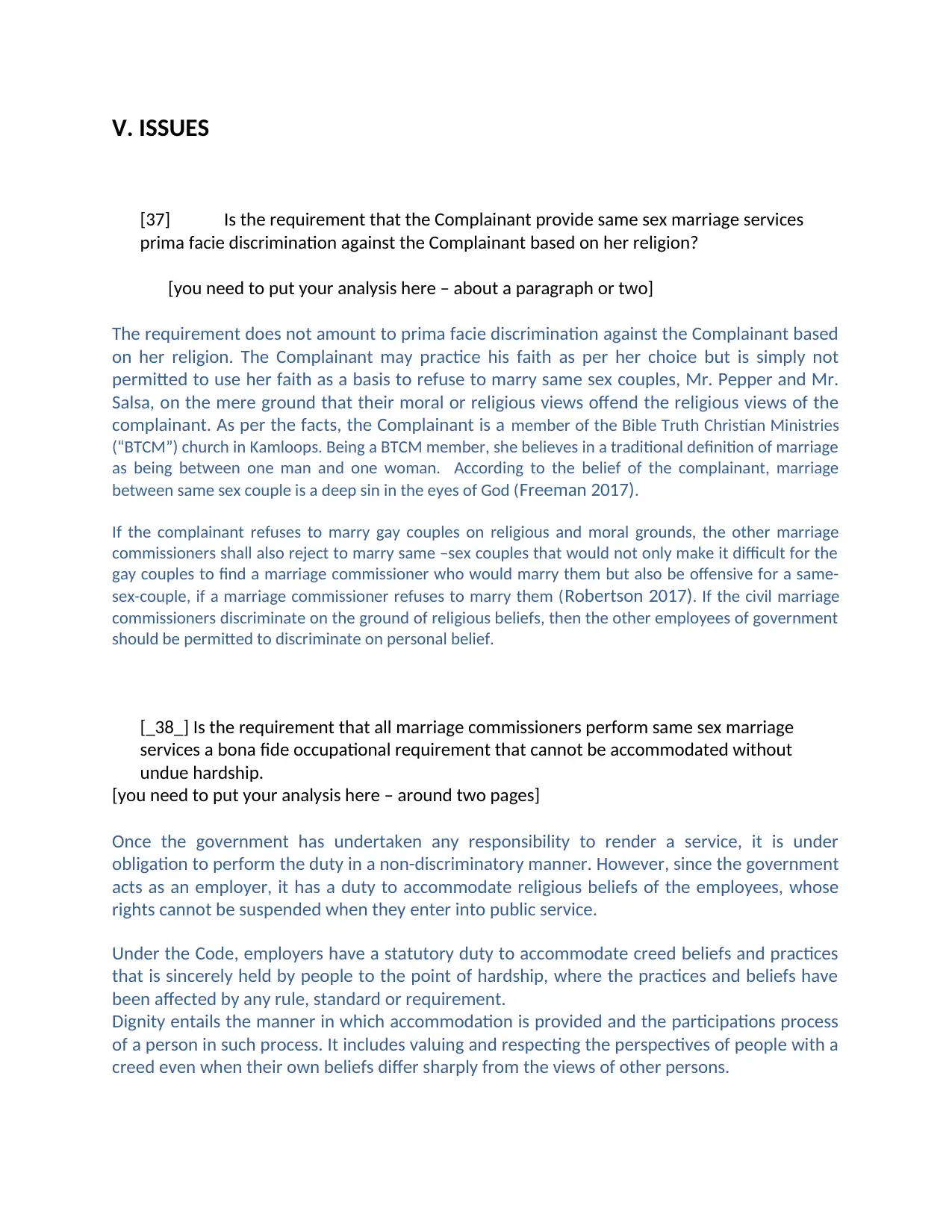
V. ISSUES
[37] Is the requirement that the Complainant provide same sex marriage services
prima facie discrimination against the Complainant based on her religion?
[you need to put your analysis here – about a paragraph or two]
The requirement does not amount to prima facie discrimination against the Complainant based
on her religion. The Complainant may practice his faith as per her choice but is simply not
permitted to use her faith as a basis to refuse to marry same sex couples, Mr. Pepper and Mr.
Salsa, on the mere ground that their moral or religious views offend the religious views of the
complainant. As per the facts, the Complainant is a member of the Bible Truth Christian Ministries
(“BTCM”) church in Kamloops. Being a BTCM member, she believes in a traditional definition of marriage
as being between one man and one woman. According to the belief of the complainant, marriage
between same sex couple is a deep sin in the eyes of God (Freeman 2017).
If the complainant refuses to marry gay couples on religious and moral grounds, the other marriage
commissioners shall also reject to marry same –sex couples that would not only make it difficult for the
gay couples to find a marriage commissioner who would marry them but also be offensive for a same-
sex-couple, if a marriage commissioner refuses to marry them (Robertson 2017). If the civil marriage
commissioners discriminate on the ground of religious beliefs, then the other employees of government
should be permitted to discriminate on personal belief.
[_38_] Is the requirement that all marriage commissioners perform same sex marriage
services a bona fide occupational requirement that cannot be accommodated without
undue hardship.
[you need to put your analysis here – around two pages]
Once the government has undertaken any responsibility to render a service, it is under
obligation to perform the duty in a non-discriminatory manner. However, since the government
acts as an employer, it has a duty to accommodate religious beliefs of the employees, whose
rights cannot be suspended when they enter into public service.
Under the Code, employers have a statutory duty to accommodate creed beliefs and practices
that is sincerely held by people to the point of hardship, where the practices and beliefs have
been affected by any rule, standard or requirement.
Dignity entails the manner in which accommodation is provided and the participations process
of a person in such process. It includes valuing and respecting the perspectives of people with a
creed even when their own beliefs differ sharply from the views of other persons.
[37] Is the requirement that the Complainant provide same sex marriage services
prima facie discrimination against the Complainant based on her religion?
[you need to put your analysis here – about a paragraph or two]
The requirement does not amount to prima facie discrimination against the Complainant based
on her religion. The Complainant may practice his faith as per her choice but is simply not
permitted to use her faith as a basis to refuse to marry same sex couples, Mr. Pepper and Mr.
Salsa, on the mere ground that their moral or religious views offend the religious views of the
complainant. As per the facts, the Complainant is a member of the Bible Truth Christian Ministries
(“BTCM”) church in Kamloops. Being a BTCM member, she believes in a traditional definition of marriage
as being between one man and one woman. According to the belief of the complainant, marriage
between same sex couple is a deep sin in the eyes of God (Freeman 2017).
If the complainant refuses to marry gay couples on religious and moral grounds, the other marriage
commissioners shall also reject to marry same –sex couples that would not only make it difficult for the
gay couples to find a marriage commissioner who would marry them but also be offensive for a same-
sex-couple, if a marriage commissioner refuses to marry them (Robertson 2017). If the civil marriage
commissioners discriminate on the ground of religious beliefs, then the other employees of government
should be permitted to discriminate on personal belief.
[_38_] Is the requirement that all marriage commissioners perform same sex marriage
services a bona fide occupational requirement that cannot be accommodated without
undue hardship.
[you need to put your analysis here – around two pages]
Once the government has undertaken any responsibility to render a service, it is under
obligation to perform the duty in a non-discriminatory manner. However, since the government
acts as an employer, it has a duty to accommodate religious beliefs of the employees, whose
rights cannot be suspended when they enter into public service.
Under the Code, employers have a statutory duty to accommodate creed beliefs and practices
that is sincerely held by people to the point of hardship, where the practices and beliefs have
been affected by any rule, standard or requirement.
Dignity entails the manner in which accommodation is provided and the participations process
of a person in such process. It includes valuing and respecting the perspectives of people with a
creed even when their own beliefs differ sharply from the views of other persons.
Paraphrase This Document
Need a fresh take? Get an instant paraphrase of this document with our AI Paraphraser
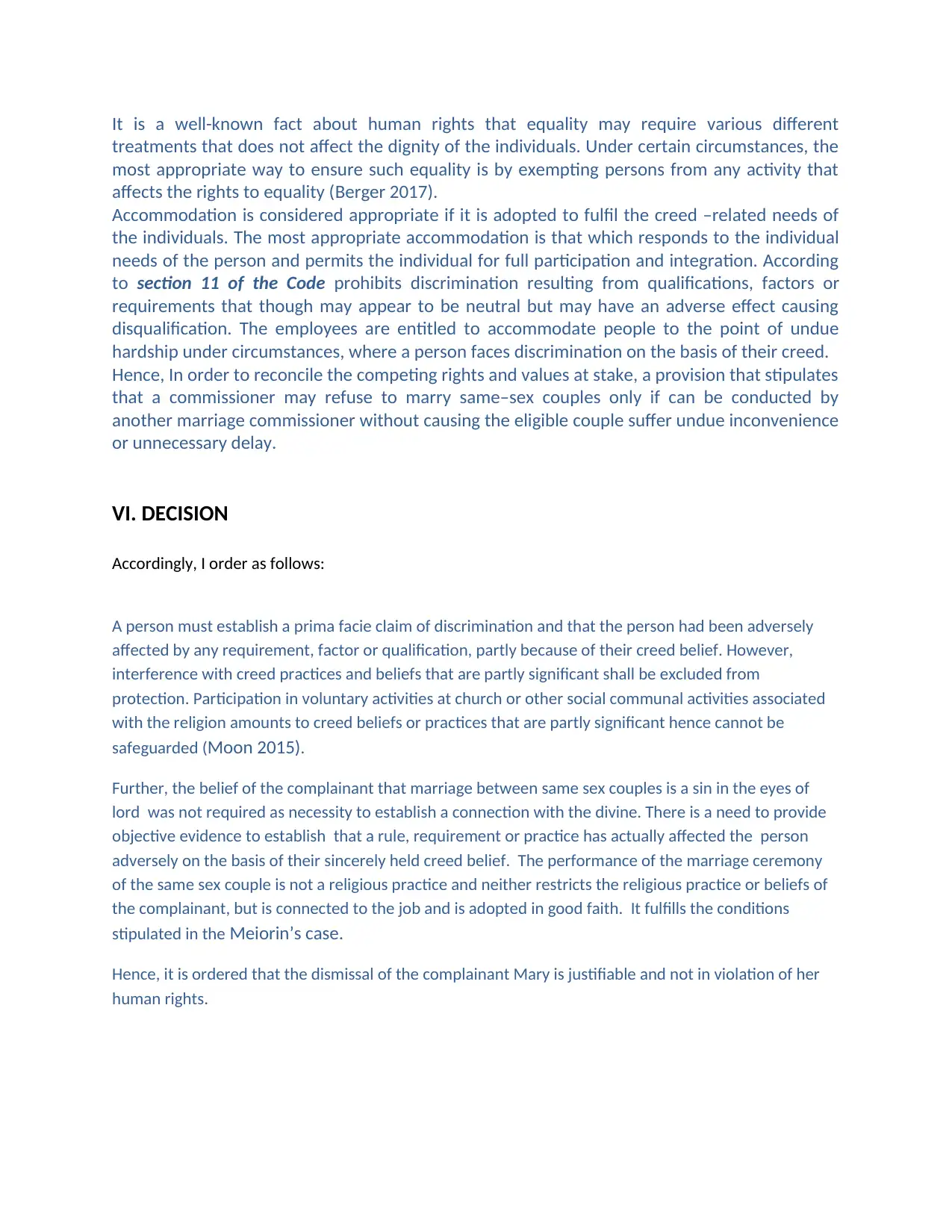
It is a well-known fact about human rights that equality may require various different
treatments that does not affect the dignity of the individuals. Under certain circumstances, the
most appropriate way to ensure such equality is by exempting persons from any activity that
affects the rights to equality (Berger 2017).
Accommodation is considered appropriate if it is adopted to fulfil the creed –related needs of
the individuals. The most appropriate accommodation is that which responds to the individual
needs of the person and permits the individual for full participation and integration. According
to section 11 of the Code prohibits discrimination resulting from qualifications, factors or
requirements that though may appear to be neutral but may have an adverse effect causing
disqualification. The employees are entitled to accommodate people to the point of undue
hardship under circumstances, where a person faces discrimination on the basis of their creed.
Hence, In order to reconcile the competing rights and values at stake, a provision that stipulates
that a commissioner may refuse to marry same–sex couples only if can be conducted by
another marriage commissioner without causing the eligible couple suffer undue inconvenience
or unnecessary delay.
VI. DECISION
Accordingly, I order as follows:
A person must establish a prima facie claim of discrimination and that the person had been adversely
affected by any requirement, factor or qualification, partly because of their creed belief. However,
interference with creed practices and beliefs that are partly significant shall be excluded from
protection. Participation in voluntary activities at church or other social communal activities associated
with the religion amounts to creed beliefs or practices that are partly significant hence cannot be
safeguarded (Moon 2015).
Further, the belief of the complainant that marriage between same sex couples is a sin in the eyes of
lord was not required as necessity to establish a connection with the divine. There is a need to provide
objective evidence to establish that a rule, requirement or practice has actually affected the person
adversely on the basis of their sincerely held creed belief. The performance of the marriage ceremony
of the same sex couple is not a religious practice and neither restricts the religious practice or beliefs of
the complainant, but is connected to the job and is adopted in good faith. It fulfills the conditions
stipulated in the Meiorin’s case.
Hence, it is ordered that the dismissal of the complainant Mary is justifiable and not in violation of her
human rights.
treatments that does not affect the dignity of the individuals. Under certain circumstances, the
most appropriate way to ensure such equality is by exempting persons from any activity that
affects the rights to equality (Berger 2017).
Accommodation is considered appropriate if it is adopted to fulfil the creed –related needs of
the individuals. The most appropriate accommodation is that which responds to the individual
needs of the person and permits the individual for full participation and integration. According
to section 11 of the Code prohibits discrimination resulting from qualifications, factors or
requirements that though may appear to be neutral but may have an adverse effect causing
disqualification. The employees are entitled to accommodate people to the point of undue
hardship under circumstances, where a person faces discrimination on the basis of their creed.
Hence, In order to reconcile the competing rights and values at stake, a provision that stipulates
that a commissioner may refuse to marry same–sex couples only if can be conducted by
another marriage commissioner without causing the eligible couple suffer undue inconvenience
or unnecessary delay.
VI. DECISION
Accordingly, I order as follows:
A person must establish a prima facie claim of discrimination and that the person had been adversely
affected by any requirement, factor or qualification, partly because of their creed belief. However,
interference with creed practices and beliefs that are partly significant shall be excluded from
protection. Participation in voluntary activities at church or other social communal activities associated
with the religion amounts to creed beliefs or practices that are partly significant hence cannot be
safeguarded (Moon 2015).
Further, the belief of the complainant that marriage between same sex couples is a sin in the eyes of
lord was not required as necessity to establish a connection with the divine. There is a need to provide
objective evidence to establish that a rule, requirement or practice has actually affected the person
adversely on the basis of their sincerely held creed belief. The performance of the marriage ceremony
of the same sex couple is not a religious practice and neither restricts the religious practice or beliefs of
the complainant, but is connected to the job and is adopted in good faith. It fulfills the conditions
stipulated in the Meiorin’s case.
Hence, it is ordered that the dismissal of the complainant Mary is justifiable and not in violation of her
human rights.
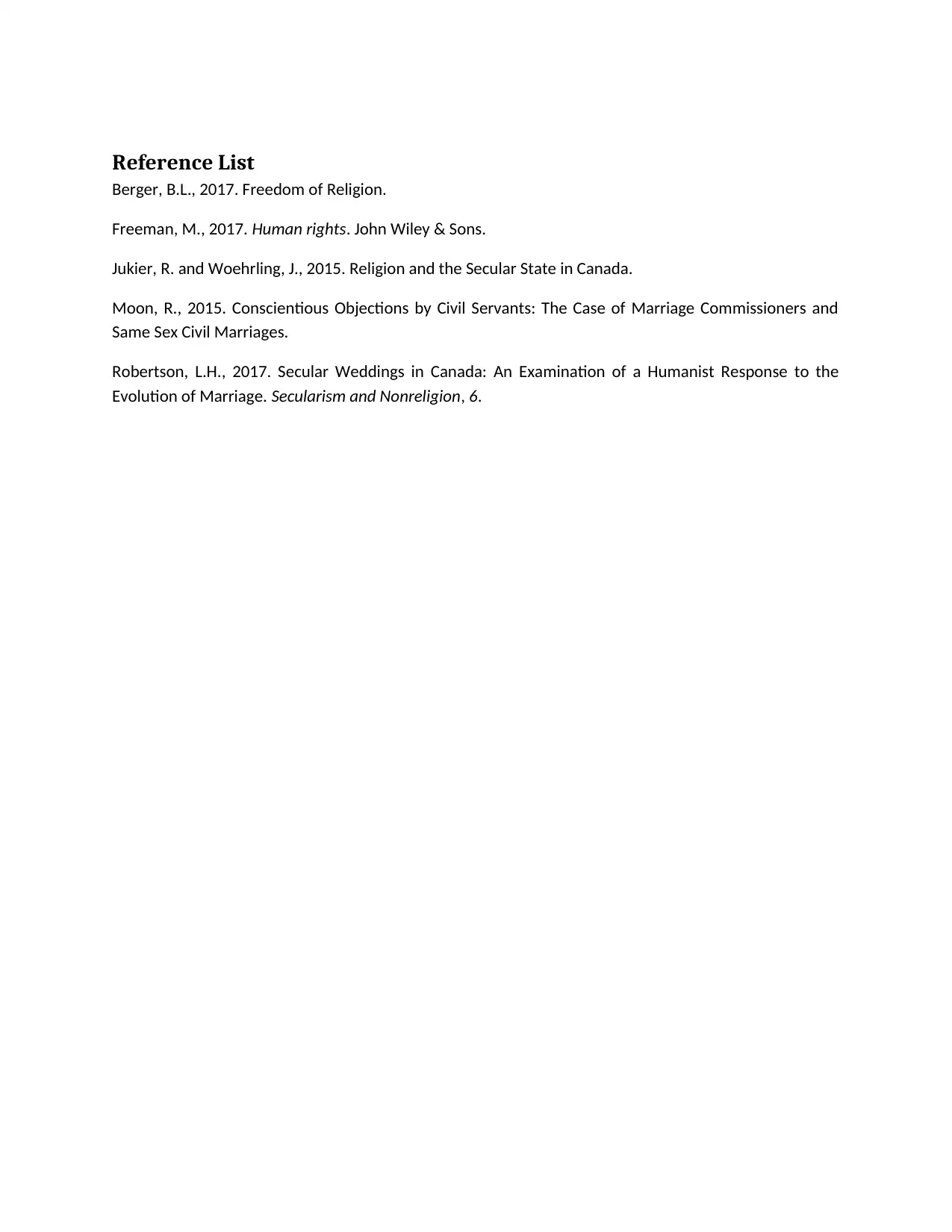
Reference List
Berger, B.L., 2017. Freedom of Religion.
Freeman, M., 2017. Human rights. John Wiley & Sons.
Jukier, R. and Woehrling, J., 2015. Religion and the Secular State in Canada.
Moon, R., 2015. Conscientious Objections by Civil Servants: The Case of Marriage Commissioners and
Same Sex Civil Marriages.
Robertson, L.H., 2017. Secular Weddings in Canada: An Examination of a Humanist Response to the
Evolution of Marriage. Secularism and Nonreligion, 6.
Berger, B.L., 2017. Freedom of Religion.
Freeman, M., 2017. Human rights. John Wiley & Sons.
Jukier, R. and Woehrling, J., 2015. Religion and the Secular State in Canada.
Moon, R., 2015. Conscientious Objections by Civil Servants: The Case of Marriage Commissioners and
Same Sex Civil Marriages.
Robertson, L.H., 2017. Secular Weddings in Canada: An Examination of a Humanist Response to the
Evolution of Marriage. Secularism and Nonreligion, 6.
⊘ This is a preview!⊘
Do you want full access?
Subscribe today to unlock all pages.

Trusted by 1+ million students worldwide
1 out of 9
Your All-in-One AI-Powered Toolkit for Academic Success.
+13062052269
info@desklib.com
Available 24*7 on WhatsApp / Email
![[object Object]](/_next/static/media/star-bottom.7253800d.svg)
Unlock your academic potential
Copyright © 2020–2025 A2Z Services. All Rights Reserved. Developed and managed by ZUCOL.